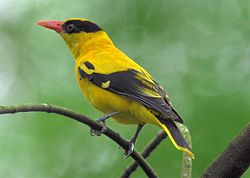The Affluence of Yesteryears
"Binuriki ang paraka it sangka manara nga antulihaw."
What does it means? Aklanons of today find it hard to comprehend even if they can pronounce or read the statement perfectly: "Binuriki ang paraka it sangka manara nga antulihaw." One familiar with the place will not be puzzled for a number of reasons.
Let me elucidate some of its parts. Let us start with the last word, "antulihaw". Oriole. Yes, "antulihaw" is the visayan name of that songbird of bright orange and black plumage. Now a rare bird in rural Balete, oriole used to be a typical "alarm clock" of farmers of yesteryears. Old folks would quipped upon hearing its singsong that is already 7 in the morning.
Now, when you hear your old folks talked of "sangka manarang antulihaw" they mean to say that there were a dozen of orioles or "many" orioles. We do not say that anymore today, sadly speaking. For even I, now 43, happened to see it only a couple of times. And I have to scale the heights to Murao Falls to have a glimpse of it.
"Paraka" is a very huge "sack" that can accommodate 10 cavans of palay. Its use was very popular prior to the advent of "Masagana 99" of then President Marcos. As the fertile land turned acidic over the years of abuse and sustained exposure to synthetic fertilizers and deviant insecticidal and herbicidal inputs, its use became irrelevant and superfluous. My grandfather with his small farmland to till used to have three "paraka" overflowing with sweet-smelling harvest "displayed prominently" on his "tambobo" (barn). Some adventurous juveniles would however creep underneath and insert through the bamboo slats some bamboo tubes called "buriki" to steal some rice from the old man. The "paraka" stands still towering over an average Filipino even if it is empty. One realizes later that it is already empty on close inspection.
Upon discovery (which usually occur in the morning around 7), the outwitted farmer curses and later on console himself voicing out: "Binuriki t'a ang paraka it sangka manara nga antulihaw".
What does it means? Aklanons of today find it hard to comprehend even if they can pronounce or read the statement perfectly: "Binuriki ang paraka it sangka manara nga antulihaw." One familiar with the place will not be puzzled for a number of reasons.
 |
| Philippine Oriole |
Now, when you hear your old folks talked of "sangka manarang antulihaw" they mean to say that there were a dozen of orioles or "many" orioles. We do not say that anymore today, sadly speaking. For even I, now 43, happened to see it only a couple of times. And I have to scale the heights to Murao Falls to have a glimpse of it.
"Paraka" is a very huge "sack" that can accommodate 10 cavans of palay. Its use was very popular prior to the advent of "Masagana 99" of then President Marcos. As the fertile land turned acidic over the years of abuse and sustained exposure to synthetic fertilizers and deviant insecticidal and herbicidal inputs, its use became irrelevant and superfluous. My grandfather with his small farmland to till used to have three "paraka" overflowing with sweet-smelling harvest "displayed prominently" on his "tambobo" (barn). Some adventurous juveniles would however creep underneath and insert through the bamboo slats some bamboo tubes called "buriki" to steal some rice from the old man. The "paraka" stands still towering over an average Filipino even if it is empty. One realizes later that it is already empty on close inspection.
Upon discovery (which usually occur in the morning around 7), the outwitted farmer curses and later on console himself voicing out: "Binuriki t'a ang paraka it sangka manara nga antulihaw".


Comments
Post a Comment